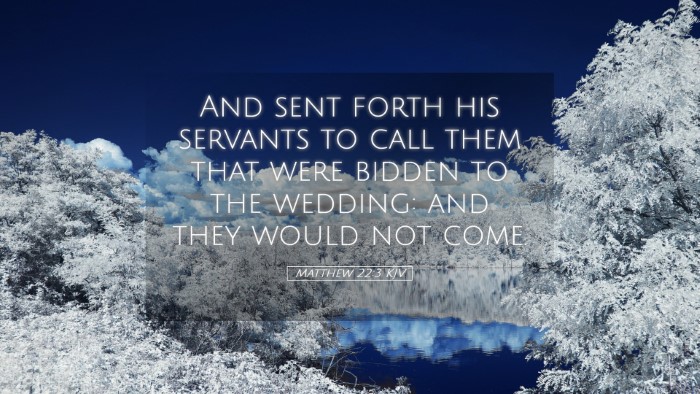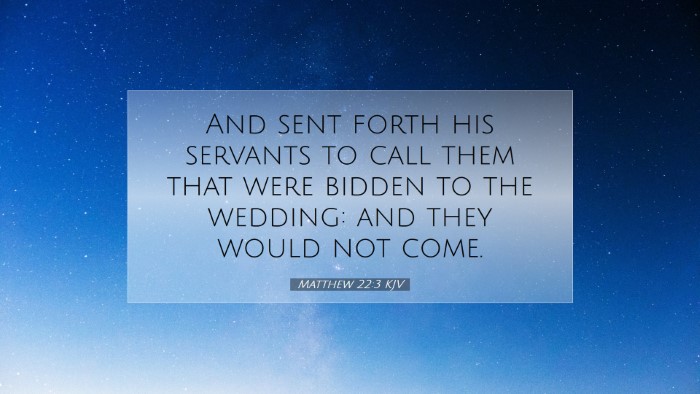Commentary on Matthew 22:3
Verse Text: "And sent forth his servants to call them that were bidden to the wedding: and they would not come."
Introduction
Matthew 22:3 forms part of the Parable of the Wedding Feast, which illustrates the kingdom of heaven and the rejection of God's invitation by the people of Israel. This verse sets the stage for the rejection that permeates this parable and serves as a call to reflection upon human response to divine invitations. Insights from public domain commentaries such as those by Matthew Henry, Albert Barnes, and Adam Clarke will expand on the implications found here.
Exegesis of Matthew 22:3
Understanding the Context
This verse is situated in Matthew's Gospel, which emphasizes the teachings of Jesus through parables. In this context, the king represents God, and the wedding feast symbolizes the kingdom of heaven. The initial invitations to the wedding reflect God’s call to His chosen people—Israel. The rejection of the invitation speaks volumes about the unwillingness of the people to engage with God's gracious offer.
Literal and Thematic Analysis
Literal Interpretation: The servants sent by the king signify the prophets and messengers God dispatched throughout history. The act of inviting those bidden illustrates the exclusive relationship God had with Israel, who were the first to receive His revelations.
Thematic Insights: The rejection of the invitation spotlights humanity's persistent tendency to dismiss divine overtures. It raises critical theological themes surrounding unresponsiveness, grace, and judgment.
Commentary Insights
Matthew Henry's Commentary
Henry notes that the king’s sending forth of his servants signifies God's readiness to invite all to partake in His blessings. The refusal of those invited indicates not only their rejection of the invitation but also their ungratefulness. He emphasizes that the invitation to the wedding feast is an emblem of the gospel message, which is often met with indifference and contempt by those who ought to accept it. This illustrates a profound truth regarding the nature of divine grace; God's offers are not always met with a favorable response.
Albert Barnes' Exposition
Barnes elaborates on the refusal of those invited, indicating that their dismissal of the invitation implies a deliberate choice. He points out that this rejection may stem from various distractions—worldly concerns, self-importance, and a lack of spiritual awareness. This commentary stresses the spiritual blindness that accompanies the dismissal of God’s call. Furthermore, it serves as a dire warning to those engaged in complacency or resistant to God’s purposes.
Adam Clarke's Commentary
Clarke highlights the significance of the “servants” as representatives of God’s prophets and servants throughout history. He notes the parallel between the physical wedding feast and the spiritual feast God offers. Clarke draws attention to the serious consequences of failing to heed God’s call—a theme prevalent throughout Scripture. He asserts that the rejection signifies a broader message of judgment against those who would ignore the grace presented to them, showcasing God's desire for all to participate in His kingdom.
Theological Implications
The refusal to come to the wedding feast invokes theological reflections about God’s desire for relationship with humanity. It encapsulates the themes of election, grace, and the tragic consequences of unbelief. Scholars and theologians are urged to consider the holistic approach of viewing God’s initiatives toward humanity as both gracious and sovereign.
- Grace and Judgment: The juxtaposition of grace offered and judgment for rejection helps us understand God's nature.
- Human Agency: There is a significant emphasis on the choices that individuals make regarding God's invitations.
- Inclusivity of the Kingdom: The invitation opens a door for all, transcending previous boundaries, a precursor to the Great Commission.
Practical Applications for Pastors and Theologians
Reflecting on Matthew 22:3, pastoral application may invite congregations to consider their responsiveness to God’s call in their everyday lives. The challenge is to determine what worldly influences may lead to a hardened heart and how to cultivate a spirit of openness and receptiveness towards God’s leading.
For theologians and students of Scripture, this passage presents an opportunity for deeper exploration into themes of election and inclusivity. Investigating how this parable interacts with themes of covenant and prophecy can yield rich insights for biblical studies. This calls for rigorous discourse on the implications of rejecting God’s call in both the Old and New Testaments.
Conclusion
Matthew 22:3, when examined through the lens of historic commentaries, reveals profound truths about human nature, divine grace, and the serious implications of rejecting God’s invitation. This parable serves as a timeless reminder for believers and scholars to stay vigilant in their faith journey, responding faithfully to the gracious calls extended by their God. Through the integration of Henry, Barnes, and Clarke's insights, we are challenged to reflect, repent, and rejoice in God's unfathomable grace.


